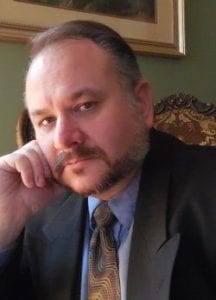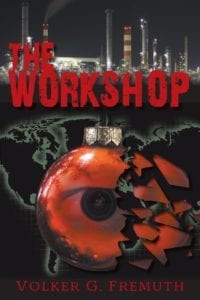Volker G. Fremuth Author Interview
Interview with Volker G. Fremuth Author of The Workshop
 Q:When did you first realize you wanted to be a writer?:
Q:When did you first realize you wanted to be a writer?:
A:This is an interesting question, as I never intended to be a writer. I started in advertising and design. I took a role as a creative director early in my career and found myself copy writing by necessity. As I progressed into corporate marketing, communications and business, I found myself writing a great deal of copy, press releases and business articles. Consequently the creative writing of this type of fiction seemed to be a natural melding of my love of literature and history, my experience, my interests and my continued pursuit of creative expression.
Q:How long does it take you to write a book?:
A:My debut novel “The Workshop” took me about two years to research and write. The concept however has lived with me for many years so one could argue the inspiration for a book being part of the process of molding the storyline is a summation of the years of your life’s experience.
Q:What is your work schedule like when you’re writing?:
A:Keeping in mind that I still have a “day job” my writing is largely done on weekends, on airplanes, in hotels as I travel for work and all too often when I cannot sleep. I might suggest a similar schedule to those who read a book.
Q:What would you say is your interesting writing quirk?:
A:I am, and will always be, visually driven, creatively. Consequently my writing is done largely as a description of what I was seeing in my mind’s eye. As my characters go through the action of the storyline, I feel as though I am chronicling their experience, seeing it as it happens. This is perhaps why I have heard more than a few times, “this would make a great movie” because this is in effect how I experienced it.
Q:How do books get published?:
A:After finishing and tweaking the draft of my book, I sought to find a publisher. It became quickly apparent that most publishers did not want to take any risk in publishing an unproven talent. Indeed, as I have no celebrity credentials nor did I come with a preexisting audience few would even consider reading the manuscript. So I opted to self-publish for both expediency and artistic freedom. I have not regretted going in this direction to date.
Q:What do you like to do when you’re not writing?:
A:I suppose I identify with Jason, the main character of my novel “The Workshop”, who is a bit of a workaholic driven by the pursuits of the corporate machine which occupies too much of his time. Still, when I can break free of work and writing, I enjoy working on my house and yard, other creative endeavors in the visual arts and interests ranging from flying to horseback riding.
Q:Where do you get your information or ideas for your books?:
A:When I first started writing “The Workshop”, the concept had been winding through the passages in my mind for some time, a long time. It was a fanciful “what if” question, a playful ruse, spawned from a brief conversation with a friend as a teenager. My cynical answer to him at that time remained with me. As I grew older the concept became even more interesting and sophisticated. Eventually I felt compelled to put it to paper and drew on my own experience, knowledge, and research. It should be noted that all of the technological, social, economic, and political activities and history are based in fact and manipulated only to help drive the narrative.
Q:What does your family think of your writing?:
A:My wife is my strongest critic and yet my staunchest supporter. The rest of my family seem to be surprised I can string two sentences together.
Q:What was one of the most surprising things you learned in creating your books?:
A:That I can actually write them.
Q:Do you hear from your readers much? What kinds of things do they say?:
A:The audience for my book is still a very small community. That said the different perspective put forth in my book intrigues many. One of the most common comments I hear is “thought provoking”. I am rather humbled and proud of that.
Q:Do you like to create books for kids or adults? and Why?:
A:Even as a child I did not relate well to children. I was always more comfortable addressing adults in both concept and conversation. Consequently, my book “The Workshop” and the one I am currently writing are decidedly adult in orientation. That sounds humorless, which is not the case, but I expect that the themes are likely more relevant to an adult audience.
Q:What do you think makes a good story?:
A:Good writing can entertain, even draw you in and bring you into the experience, but a truly good story should stay with you when it is done. A good story should leave something of itself behind even when you move on to the next, a thought that made you question the world around you, a perspective that changed your point of view, strengthened a conviction or simply makes you smile when you think back on it.
Q:As a child, what did you want to do when you grew up?:
A:The funny thing is that like many children I wanted to be a paleontologist or cosmologist. Simply put, I wanted to be a scientist. Still, it was apparent at a very early age that I would pursue a career in the arts. That path deviated but never truly diverged.
Connect with Volker G. Fremuth
Website : www.theworkshopbook.com
Facebook: www.facebook.com/TheWorkshopBook
About the book:
 The novel “The Workshop” centers on protagonist, Jason Pelham, a senior manager whose talents propel him toward the top of the food chain of one of the largest corporations in the world; but with his ascension he becomes aware of the corruption and predation that inherently seems to cast its shadow over even the most virtuous when given access to ultimate power and money. The company, also known as the Workshop, offers its service at the pleasure of the people who, due to their own desires for it, become the unwitting pawns in a game of power, politics, exploitation, and greed.
The novel “The Workshop” centers on protagonist, Jason Pelham, a senior manager whose talents propel him toward the top of the food chain of one of the largest corporations in the world; but with his ascension he becomes aware of the corruption and predation that inherently seems to cast its shadow over even the most virtuous when given access to ultimate power and money. The company, also known as the Workshop, offers its service at the pleasure of the people who, due to their own desires for it, become the unwitting pawns in a game of power, politics, exploitation, and greed.
The concepts behind “The Workshop” asks one to consider lore as history and what the world would look like had it been so. The fanciful and pleasing nature of a legend takes on a new and potentially sinister twist when forced to fit the mold of cold hard reality. What seems fun, exciting, even precious, and endearing may not be so when you replace fantasy with fact, magic with practicality, omnipotence with resources, and knowledge with the technology of espionage. Then, with this adjustment made, consider how the world might react to this new reality. Keeping the story in this new context palpable leads the reader into an environment which exploits the conundrum that comes when faced with power and knowledge, its practical application, the morality of doing so, and how to protect the populace from those who would seek to abuse it if they could.



